Contents
- Phrases for Talking About the Weather in French
- Expressions About the Weather in French
- How to Ask About the Weather in French
- Everyday French Weather Vocabulary
- French Terms for Extreme Weather Conditions
- Scientific French Weather Terms
- French Idioms Related to the Weather
- French Proverbs Related to the Weather
- How to Practice French Weather Vocabulary
- And One More Thing...
162 French Weather Vocabulary Terms and Expressions [With Audio]

“The weather” in French is le temps or la météo, which is usually used to talk about the weather forecast. Being able to talk about the weather in French is useful for making small talk and understanding the forecast when you’re traveling in the French-speaking world.
This post will cover all the vocabulary you need, from the most common words and phrases to some popular idioms and expressions. We’ll also show you how to ask questions about the weather in French so you know what to expect when you step out for the day.
Download: This blog post is available as a convenient and portable PDF that you can take anywhere. Click here to get a copy. (Download)
Phrases for Talking About the Weather in French
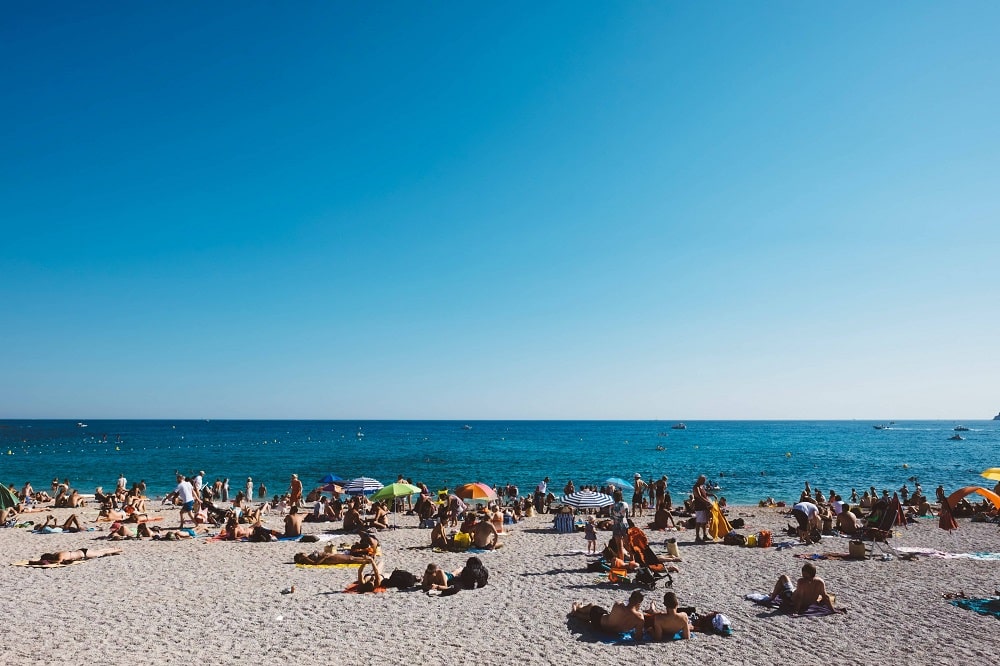
Many phrases about the weather in French start with Il fait, C’est or Il. We’ll show you how to use each one below.
Il fait… + [adjective]
Il fait literally means “it makes” and you’ll use it with an adjective to form some of the most basic weather expressions, as follows:
| French | English |
|---|---|
| Il fait froid. | It's cold. |
| Il fait très froid. | It's very cold. |
| Il fait frais. | It's cool (temperature). |
| Il fait beau. | It's nice out (Literally: It makes beautiful). |
| Il fait chaud. | It's hot. |
| Il fait mauvais. | The weather is bad. |
| Il fait moche. | The weather is bad (Literally: It makes ugly). |
| Il y a du vent. | It's windy. |
| Il y a du soleil. | It's sunny. |
| Il y a du brouillard. | It's foggy. (Literally: There is fog). |
C’est… + [adjective]
You can also start your basic weather sentences with c’est (literally, “this/that is”), also followed by an adjective:
| French | English |
|---|---|
| C'est nuageux. | It's cloudy. |
| C'est gelé. | It's icy. |
| C'est glacé. | It's icy cold. |
| C'est orageux. | It's stormy. |
| C'est humide. | It's humid. |
Il + [verb]
The verbs pleuvoir (to rain) and neiger (to snow) are used in the third-person singular:
Il pleut. (It’s raining.)
Il neige. (It’s snowing.)
Expressions About the Weather in French
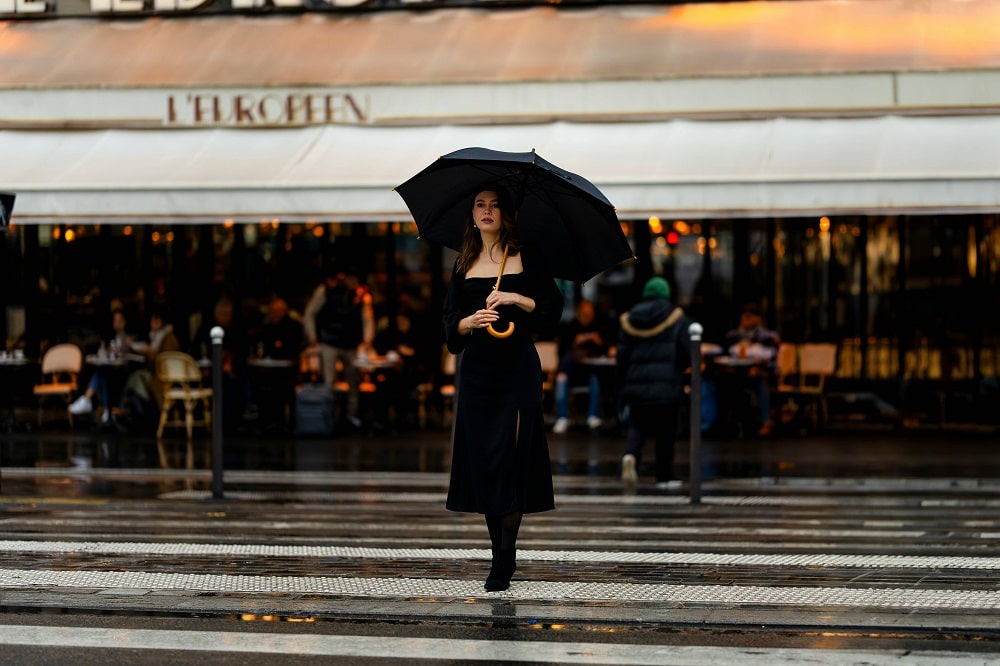
Here are some more common French expressions for commenting on the weather.
| French expression | English |
|---|---|
| Le ciel est clair. | The sky is clear. |
| Le temps est clair. | The weather is clear. |
| Il y a des éclaircies. | There are clear spells. |
| Le soleil brille. | The sun is shining. |
| La météo est variable. | The weather is changeable. |
| Il y a de l'orage. | There's a storm. |
| Le temps est maussade. | The weather is gloomy. |
| Il pleut à seaux. | It's raining buckets. |
| On crève de chaud. | The heat is killing us! |
| J’adore quand il pleut. | I love it when it rains. |
| Je déteste quand il fait trop chaud. | I hate it when it’s too hot. |
How to Ask About the Weather in French

These questions will help you ask about the weather so you know what to expect and can be well prepared:
Everyday French Weather Vocabulary
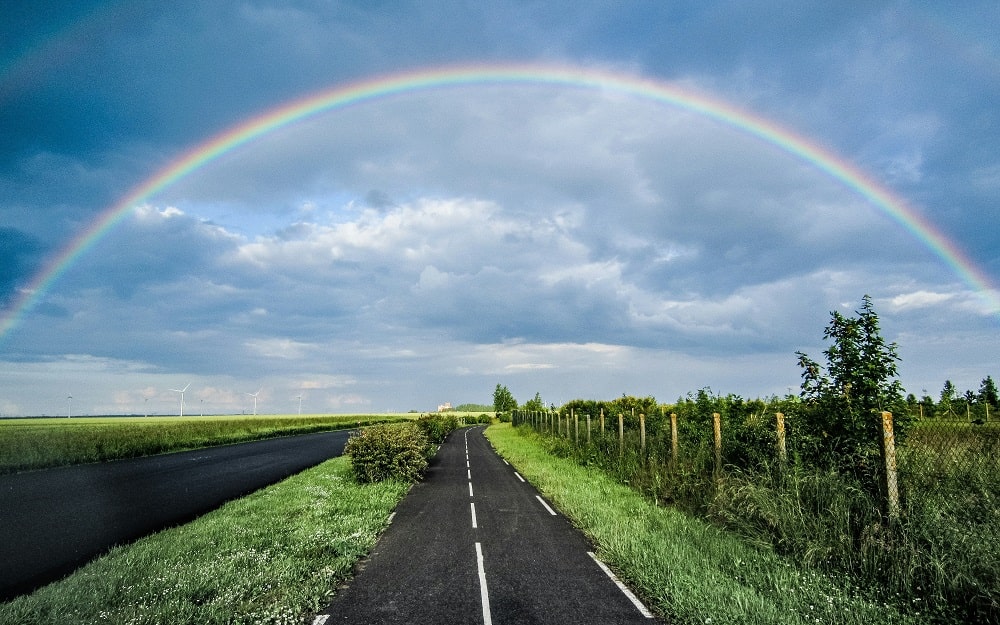
We’ve compiled a list of some common French terms that often come up in small talk about the weather. You may need to review our guide on French nouns to use them properly in conversation.
| French | English | Example Sentence |
|---|---|---|
| temps | weather | Il fait beau temps aujourd'hui.
(The weather is nice today.) |
| ciel | sky | Le ciel est dégagé ce soir.
(The sky is clear tonight.) |
| soleil | sun | Le soleil brille intensément en été.
(The sun shines brightly in the summer.) |
| lune | moon | La lune est pleine ce soir.
(The moon is full tonight.) |
| étoiles | stars | Les étoiles scintillent dans le ciel de la nuit.
(The stars twinkle in the nighttime sky.) |
| nuages | clouds | Les nuages couvrent le ciel aujourd'hui.
(The clouds cover the sky today.) |
| vent | wind | Le vent souffle fort près de la côte.
(The wind is blowing strongly near the coast.) |
| brise | breeze | Une légère brise rafraîchit l'air en été.
(A gentle breeze cools the air in the summer.) |
| pluie | rain | La pluie tombe depuis ce matin.
(The rain has been falling since this morning.) |
| goutte de pluie | raindrop | Une seule goutte de pluie déclencha des éclats de rire joyeux.
(A single raindrop triggered bursts of joyful laughter.) |
| neige | snow | La neige recouvre tout le paysage en hiver.
(The snow covers the entire landscape in winter.) |
| flocon de neige | snowflake | C'est beau à Paris quand de gros flocons de neige tombent.
(It's beautiful in Paris when large snowflakes are falling.) |
| brouillard | fog | Le brouillard réduit la visibilité sur la route.
(The fog reduces visibility on the road.) |
| rosée | dew | La rosée du matin brille sur les feuilles.
(The morning dew glistens on the leaves.) |
| givre | hoarfrost | Les arbres sont couverts de givre, créant un paysage féerique.
(The trees are covered in hoarfrost, creating a magical landscape.) |
| météo changeante | changing weather | La météo changeante rend difficile la planification des activités.
(The changing weather makes it difficult to plan activities.) |
| chaleur | heat | La chaleur est écrasante en plein été.
(The heat is overwhelming in the middle of summer.) |
| fraîcheur | coolness | J'apprécie la fraîcheur de l'air en automne.
(I appreciate the coolness of the air in the fall.) |
| froid | cold | Il fait vraiment froid dehors aujourd'hui.
(It's really cold outside today.) |
| climat | climate | Le climat de cette région est plutôt doux en général.
(The climate of this region is generally mild.) |
| averse | shower | Attends un moment, il y a une averse passagère.
(Wait a moment, there's a passing shower.) |
| crépuscule | twilight | Le crépuscule offre des couleurs magnifiques dans le ciel.
(Twilight provides beautiful colors in the sky.) |
| aube | dawn | Les oiseaux chantent à l'aube.
(The birds sing at dawn.) |
| marée | tide | Les marées sont influencées par la position de la lune.
(Tides are influenced by the position of the moon.) |
| arc-en-ciel | rainbow | Il y a un arc-en-ciel.
(There's a rainbow.) |
French Terms for Extreme Weather Conditions

Hopefully, you won’t have to experience any of these extreme weather conditions, but it’s important to understand them and know how to use them just in case!
| French | English | Example Sentence |
|---|---|---|
| tempête | storm | Une tempête approche rapidement.
(A storm is approaching rapidly.) |
| ouragan | hurricane | Les habitants ont été évacués en prévision de l'ouragan.
(The residents were evacuated in anticipation of the hurricane.) |
| a été frappé par un ouragan | was hit by a hurricane | Le village côtier a été frappé par un ouragan dévastateur.
(The coastal village was struck by a devastating hurricane.) |
| saison des ouragans | hurricane season | Les préparatifs sont intenses pendant la saison des ouragans chaque année.
(Preparations are intense during the hurricane season every year.) |
| alerte ouragan | hurricane warning | Les résidents surveillent attentivement les alertes ouragans pour se préparer.
(Residents closely monitor hurricane advisories to prepare themselves.) |
| tornade | tornado | Une tornade a causé des dégâts importants dans la région.
(A tornado caused significant damage in the area.) |
| typhon | typhoon | Le typhon s'approche des côtes avec des vents violents.
(The typhoon is approaching the coast with strong winds.) |
| cyclone | cyclone | Le cyclone a laissé derrière lui une traînée de destruction.
(The cyclone left a trail of destruction behind.) |
| trombe | waterspout | Nous avons pu observer une trombe au large.
(We were able to observe a waterspout out at sea.) |
| rafale | gust | Les rafales de vent ont atteint des vitesses impressionnantes.
(The gusts of wind reached impressive speeds.) |
| éclair | lightning | L'éclair illumina le ciel pendant une fraction de seconde.
(The lightning illuminated the sky for a split second.) |
| tonnerre | thunder | Le tonnerre grondait au loin pendant l'orage.
(The thunder rumbled in the distance during the storm.) |
| grêle | hail | La grêle a endommagé les cultures dans les champs.
(The hail damaged the crops in the fields.) |
| grêler | to hail (hailstones falling); to cause damage by hail | L'orage a grêlé la voiture.
(The hail storm caused damage to the car.) |
| neige abondante | heavy snowfall | Une neige abondante a provoqué des fermetures d'écoles.
(Heavy snowfall led to school closures.) |
| avalanche | avalanche | Une avalanche s'est produite en montagne sans avertissement.
(An avalanche occurred in the mountains without warning.) |
| blizzard | blizzard | Le blizzard rendait la visibilité presque nulle sur la route.
(The blizzard made visibility nearly zero on the road.) |
| canicule | heatwave | La canicule a entraîné des températures record dans la région.
(The heatwave resulted in record temperatures in the region.) |
| gelée | frost | La gelée matinale a recouvert les champs d'une fine couche de glace.
(The morning frost covered the fields with a thin layer of ice.) |
| verglas | black ice | Faites attention en conduisant, il pourrait y avoir du verglas sur la route.
(Be careful while driving, there might be black ice on the road.) |
| pluie torrentielle | torrential rain | Les rues étaient inondées à cause de la pluie torrentielle.
(The streets were flooded due to the torrential rain.) |
| inondation | flood | Les habitants ont été évacués en raison de l'inondation.
(The residents were evacuated due to the flood.) |
| être inondé | to be flooded | La maison a été inondée.
(The house was flooded.) |
| sécheresse | drought | La sécheresse prolongée a eu un impact sur les réserves d'eau.
(The prolonged drought has had an impact on water reserves.) |
Scientific French Weather Terms
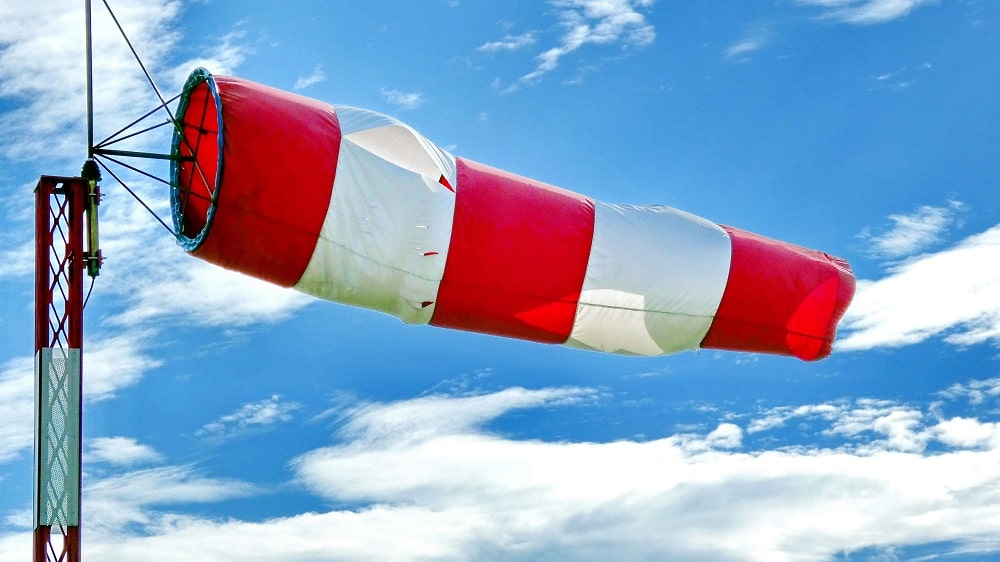
If you’re going to be watching or reading the news in French, or if you’re specifically interested in science, it will help to know some of these scientific weather terms.
| French | English | Example Sentence |
|---|---|---|
| prévisions météorologiques | weather forecast | Les prévisions météorologiques annoncent des averses pour demain matin.
(The weather forecast predicts showers for tomorrow morning) |
| humidité | humidity | L'humidité est élevée après la pluie.
(The humidity is high after the rain.) |
| thermomètre | thermometer | J'ai consulté le thermomètre pour vérifier la température extérieure.
(I checked the thermometer to verify the outdoor temperature.) |
| baromètre | barometer | Le baromètre indique que la pression atmosphérique est en baisse.
(The barometer indicates that the atmospheric pressure is dropping.) |
| pluviomètre | rain gauge | Le pluviomètre enregistre la quantité de précipitations tombées ce mois-ci.
(The rain gauge records the amount of precipitation that has fallen this month.) |
| girouette | weather vane | La girouette indique la direction d'où vient le vent.
(The weather vane indicates the direction from which the wind is coming.) |
| pression atmosphérique | atmospheric pressure | La pression atmosphérique est en train de chuter, ce qui pourrait indiquer une tempête.
(The atmospheric pressure is dropping, which could indicate a storm.) |
| rayonnement solaire | solar radiation | Le rayonnement solaire est plus intense à midi.
(Solar radiation is more intense at noon.) |
| prévisions | prediction | Les prévisions annoncent des averses pour demain.
(The weather predictions forecast showers for tomorrow.) |
| front | front (weather system) | Un front froid arrive du nord, apportant des températures plus basses.
(A cold front is coming from the north, bringing lower temperatures.) |
| météorologie | meteorology | La météorologie étudie les phénomènes atmosphériques.
(Meteorology studies atmospheric phenomena.) |
| climatologie | climatology | La climatologie se penche sur les schémas climatiques à long terme.
(Climatology examines long-term climate patterns.) |
| température | temperature | La température est en constante évolution.
(The temperature is constantly changing.) |
| précipitations | precipitation | Les précipitations annuelles moyennes varient d'une région à l'autre.
(Average annual precipitation varies from one region to another.) |
| éruption volcanique | volcanic eruption | L'éruption volcanique a provoqué une évacuation d'urgence.
(The volcanic eruption triggered an emergency evacuation.) |
| échelle de Beaufort | Beaufort scale | L'échelle de Beaufort mesure la force du vent.
(The Beaufort scale measures wind strength.) |
| condensation | condensation | La condensation forme des gouttes d'eau sur les surfaces froides.
(Condensation forms water droplets on cold surfaces.) |
| anticyclone | anticyclone | L'anticyclone apporte généralement des conditions ensoleillées.
(An anticyclone typically brings sunny conditions.) |
| dépression | depression | Une dépression s'accompagne souvent d'un temps pluvieux.
(Depression often comes with rainy weather.) |
| changement climatique | climate change | Le changement climatique a des répercussions mondiales.
(Climate change has global repercussions.) |
| réchauffement climatique | global warming | Le réchauffement climatique contribue à la fonte des glaces.
(Global warming contributes to ice melting.) |
| effet de serre | greenhouse effect | L'effet de serre retient la chaleur dans l'atmosphère.
(The greenhouse effect traps heat in the atmosphere.) |
| couches atmosphériques | atmospheric layers | Les couches atmosphériques varient en composition et en densité.
(Atmospheric layers vary in composition and density.) |
| stratosphère | stratosphere | La stratosphère abrite la couche d'ozone.
(The stratosphere houses the ozone layer.) |
| troposphère | troposphere | La troposphère est la couche la plus proche de la surface terrestre.
(The troposphere is the layer closest to the Earth's surface.) |
| ionosphère | ionosphere | L'ionosphère joue un rôle dans la propagation des ondes radio.
(The ionosphere plays a role in the propagation of radio waves.) |
| degré | degree | Il fait vingt degrés.
(It's 20 degrees Celsius/68 degrees Fahrenheit.) |
French Idioms Related to the Weather
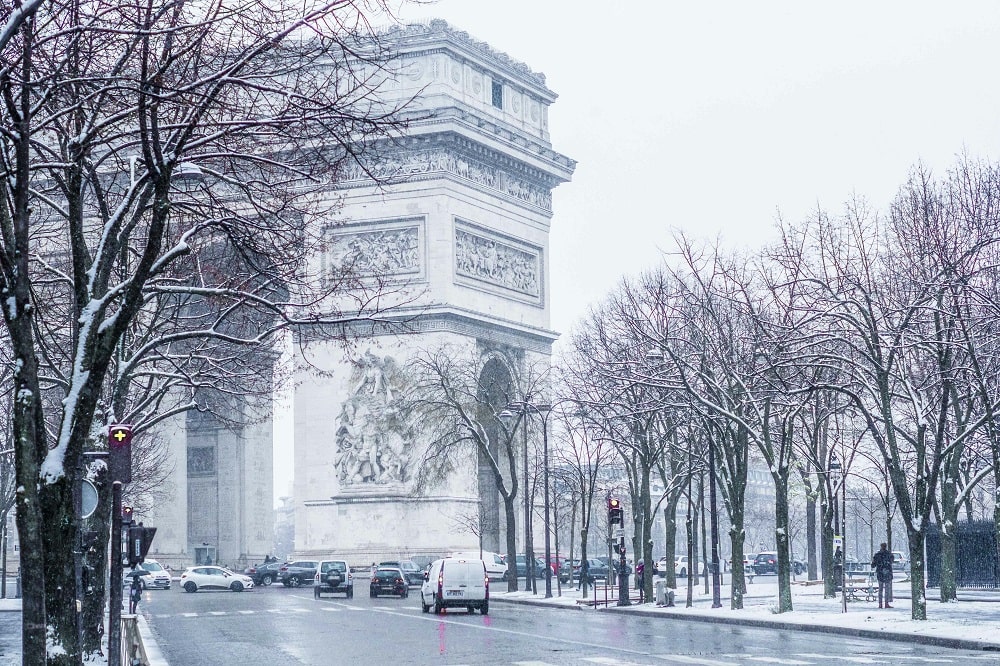
Understanding commonly used idioms in French is helpful so you don’t take them literally and get confused. You’ll really impress your French-speaking friends if you learn them well enough to use them in conversation!
| French Idiom | Literal Translation | Meaning |
|---|---|---|
| Il pleut des cordes | It's raining ropes | It's raining cats and dogs |
| Il pleut comme vache qui pisse | It's raining like a pissing cow | It's raining hard |
| Il fait un froid de canard | It's duck cold | It's freezing cold |
| Avoir le vent en poupe | To have the wind in one's sails | To have good luck or favorable conditions |
| Prendre le vent | To catch the wind | To gain an advantage from a situation |
| Faire la pluie et le beau temps | To make the rain and the nice weather | To be in control, to have power |
| Ventiler quelqu'un | To fan someone | To criticize or scold someone |
| Tomber comme des grêlons | To fall like hailstones | To fall in great numbers or rapidly |
| C'est du vent | It's wind | It's empty talk or a promise that won't be fulfilled |
| Faire un froid de loup | To be cold (like a wolf) | To be extremely cold |
| Il fait un temps de chien | The weather has gone to the dogs | The weather is horrible |
| Il pleut des hallebardes | It's raining halberds | It's pouring buckets |
| Une pluie battante | "Beating" rain | Pounding rain |
| Trempé comme une soupe | Soaked like a soup | Soaked to the skin |
| Être trempée jusqu’aux os | Soaked to the bone | Soaked to the bone |
| Ça caille | To curdle (like curdling milk) | It's freezing. |
| Il fait un soleil de plomb | The sun is made of lead | It's blistering hot. |
| Un été pourri | A rotten summer | A horrible summer (ruined by bad weather or rain) |
| Il y a un brouillard à couper au couteau | The fog is so thick you could cut it with a knife | You can replace "fog" with anything thick, such as tension or an accent. |
| Il fait un temps de Toussaint | It's All Saints' weather | Gloomy and cold weather typical of the month of November |
| Le fond de l’air est frais | The back of the air is cool | The weather is actually colder than it seems |
| Noël sous la neige | Christmas under the snow | A white Christmas |
| Les saints de glace | Ice saints | A period of three days in the month of May when it’s believed that the weather can suddenly turn cold and there’s a risk of frost. |
French Proverbs Related to the Weather
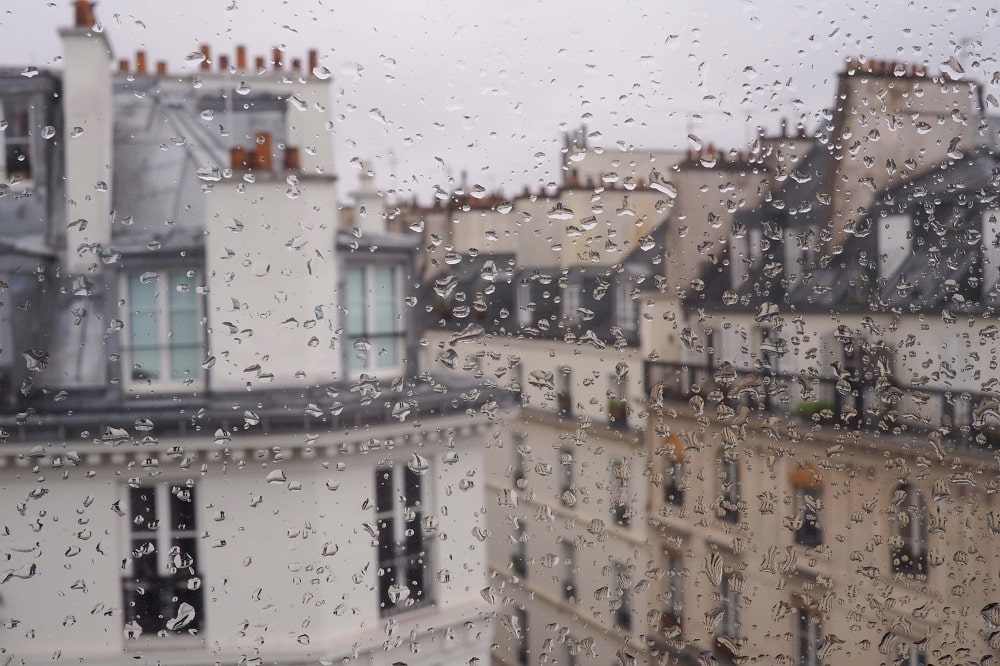
Many French proverbs involve the weather, and being familiar with them will make you that much more like a native speaker. Here we’ve compiled some of the most common weather-related proverbs in French.
| French Proverb | English Translation | Explanation |
|---|---|---|
| En avril, ne te découvre pas d'un fil. | In April, do not shed a thread. | It's cautioning against being too quick to shed warm clothing in April, as the weather can still be unpredictable. |
| Soleil levant, pluie avant. | Rising sun, rain to come. | If the sun rises while it's still raining, it's likely that the rain will continue. |
| Rosée du soir, il fera beau le lendemain. | Evening dew, it will be fine tomorrow. | If there's dew in the evening, the next day is likely to be sunny. |
| Arc-en-ciel le soir, fait bon espoir; arc-en-ciel le matin, pluie en chemin. | Rainbow in the evening, good hope; rainbow in the morning, rain on the way. | Seeing a rainbow in the evening can be a sign of good weather ahead, while a morning rainbow often predicts rain. |
| Neige en janvier, blé au grenier. | Snow in January, wheat in the granary. | If it snows in January, it's a positive sign for the upcoming harvest. |
| Orage de nuit, peu de mal, mais bien du bruit. | A storm at night doesn’t do a lot of damage, but makes a lot of noise. | Don’t worry, it will all be okay in the morning. |
| Le soleil du matin ne dure pas tout le jour. | The morning sun doesn't last all day. | A project that starts well can sometimes end in disaster. |
| Le soleil brille après la pluie. | The sun shines after the rain. | After a difficult period, things will get better. |
| Une hirondelle ne fait pas le printemps. | One swallow does not a summer make. | Don't jump to conclusions on the basis of one hint or sign. |
| Noël au balcon, Pâques au tison. | Christmas on the balcony, Easter at the embers. | A warm Christmas will mean a cold Easter. |
| En mai, fais ce qu’il te plait. | In May, do as you please. | You can dress however you want in May. |
| En juin, tu te vêtiras d’un rien. | In June, you don't have to wear much. | In June, it's so hot that you don't need to wear too many layers of clothes. |
| Chaleur d’août, c’est du bien partout. | In the heat of August, everything’s fine. | Everything is good in August since it's the height of summer. |
How to Practice French Weather Vocabulary
If you have a language exchange partner or fellow learner, you can practice your weather vocabulary using the phrases above.
We also recommend creating flashcards to study up for your conversation. You can make your own using pictures from Google Images or use a specialized flashcard app.
Another good practice method is using an immersive language program like FluentU.
FluentU takes authentic videos—like music videos, movie trailers, news and inspiring talks—and turns them into personalized language learning lessons.
You can try FluentU for free for 2 weeks. Check out the website or download the iOS app or Android app.
P.S. Click here to take advantage of our current sale! (Expires at the end of this month.)
Now that you have all of this French weather vocabulary, take out that umbrella, get your French-speaking friend to tag along and start chatting!
Download: This blog post is available as a convenient and portable PDF that you can take anywhere. Click here to get a copy. (Download)
And One More Thing...
If you like learning French at your own pace and from the comfort of your device, I have to tell you about FluentU.
FluentU makes it easier (and way more fun) to learn French by making real content like movies and series accessible to learners. You can check out FluentU's curated video library, or bring our learning tools directly to Netflix or YouTube with the FluentU Chrome extension.
One of the features I find most helpful is the interactive captions—you can tap on any word to see its meaning, an image, pronunciation, and other examples from different contexts. It’s a great way to pick up French vocab without having to pause and look things up separately.
FluentU also helps reinforce what you’ve learned with personalized quizzes. You can swipe through extra examples and complete engaging exercises that adapt to your progress. You'll get extra practice with the words you find more challenging and even be reminded you when it’s time to review!
You can use FluentU on your computer, tablet, or phone with our app for Apple or Android devices. Click here to take advantage of our current sale! (Expires at the end of this month.)











